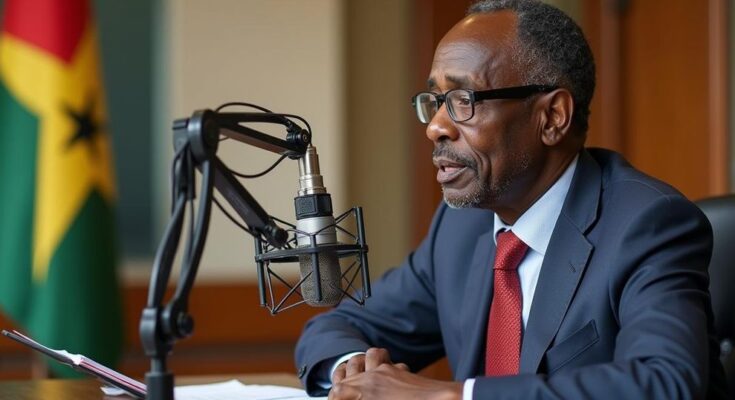In an interview, Professor Jok Madut Jok critiques President Salva Kiir’s government for misleading the public regarding elections intended to divert attention from South Sudan’s crises. He highlights the government’s failure to meet electoral benchmarks outlined in the 2018 peace agreement and expresses skepticism about the Tumaini Initiative, seeing it as another power-sharing strategy rather than a means to establish effective governance. Prof. Jok emphasizes the urgent need for a collaborative approach to address the systemic issues facing the country.
Professor Jok Madut Jok, through an interview with Radio Tamazuj, has expressed critical views on President Salva Kiir’s administration in South Sudan, particularly regarding the highly anticipated elections. He posits that the government has been misleading the populous about the prospect of elections to deflect attention from pressing issues such as hunger, displacement, and the state’s financial instability. Prof. Jok notes that the extension of the transitional government period, announced alongside the postponement of elections, was predictable and reflects a historical tendency of the government to prolong its stay in power without fulfilling electoral commitments stipulated in the 2018 peace agreement. In his assessment, Prof. Jok highlights that essential elements for credible elections, including a comprehensive census, a new constitution, security measures, and the unification of armed forces, remain unaddressed. Thus, he views the government’s insistence on elections as a distraction from the real crises affecting South Sudan. He further argues that the current leadership shows no genuine commitment to implementing the peace agreement effectively, suggesting that the past six years demonstrate little hope for the next two years to yield different results. In essence, he critiques the notion that extending the transitional period will provide the necessary conditions for successful elections, indicating that a technocratic government could offer a more viable interim solution. Additionally, regarding the Tumaini Initiative taking place in Kenya, Professor Jok expresses skepticism about its potential effectiveness. He argues that this initiative is being manipulated to create another power-sharing agreement rather than addressing the fundamental governance issues plaguing South Sudan. According to Prof. Jok, the opportunity to engage in meaningful discussions about South Sudan’s systemic problems is being squandered due to the government’s reluctance to embrace comprehensive reform proposals put forth by various stakeholders. He emphasizes the need for a collaborative approach to establish solid governance structures capable of resolving the backlogged issues such as statehood and resource management.
The ongoing political situation in South Sudan is marked by a series of postponed elections and an extended transitional government period, raising questions about the sincerity and effectiveness of the current leadership in addressing the country’s profound challenges. With a history plagued by conflict, hunger, and economic turmoil, the government under President Salva Kiir faces scrutiny regarding its commitment to implementing the 2018 peace agreement—a framework intended to restore stability and facilitate democratic governance in South Sudan. The recent Tumaini Initiative in Kenya aims to mediate a resolution among holdout opposition groups and the government; however, there are doubts about its efficacy, given the historical context of power-sharing negotiations within the region.
In conclusion, Professor Jok Madut Jok’s critical evaluation of President Salva Kiir’s government underscores the persistent obstacles facing South Sudan concerning governance, electoral integrity, and national reconciliation. The continuous postponement of elections and extension of the transitional government are indicative of a broader pattern of evasion of responsibility by the ruling powers. Furthermore, the skepticism towards the Tumaini Initiative signals a prevailing sentiment among South Sudanese scholars and civilians that unless transformative approaches to governance are embraced, the country will remain mired in conflicts and unable to meet the basic needs of its citizens.
Original Source: www.radiotamazuj.org




